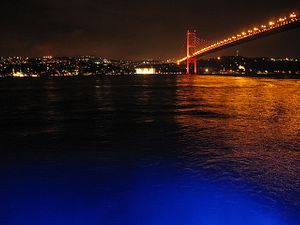On New Year’s Day, about an hour after more than 600 revelers in an Istanbul night club rung in the New Year, a gunman entered the club and began shooting. At least 39 were killed in the Reina night club, located in Ortaköy — a neighborhood on the European bank of the Bosphorus — underscoring that the spike in violence witnessed in 2016 will not abate just because a new year has begun.
The Reina attack was the fourth terrorist attack in Istanbul in the last month. On Monday, the Islamic State claimed responsibility for the attack, calling the gunman “a hero soldier of the caliphate.” The gunman remains at large, his identity a swirl of distracting rumors.
Initial news of the attack ran rampant through social media, the timing symbolic and information thin. A fake story went viral that there were two attackers, both dressed in Santa Claus costumes. The next wave of information claimed that the attacker was a Kyrgyz or Uzbek citizen. This was followed by the circulation on social media of a photo of a Kyrgyz man’s passport, identifying him as the attacker.
That news appears to be false as the man identified, 28-year old Iakhe Mashrapov, was found by local Kyrgyz media in his hometown of Kara-Suu. His passport stamps indicate that he was in Kyrgyzstan when the attack occurred. Mashrapov says he travels frequently to Istanbul for business. He flew to Istanbul on December 28 and back to Bishkek on December 30. He returned to Istanbul on January 1 and claims he was pulled off his flight by Turkish police and questioned. As the Moscow Times reports:
The officers questioned him for an hour, saying he resembled the terror suspect. Having established that he was not the man in question, they apologized and escorted him back to his plane, which had been delayed, Mashrapov says.
Upon arriving home in Kara-Suu, Mashrapov was subsequently questioned by the Kyrgyz security services, who also established he was not involved in the terror attack, Turmush reported.
This incident echoes the initial waves of information from the June 28 bombing of Ataturk International Airport in Istanbul in which 45 were killed by three suicide bombers. In the days following that attack, various sources claimed the attackers were Kyrgyz, Uzbeks, or Tajiks. Eventually two names were given — Rakim Bulgarov and Vadim Osmanov — and they reportedly carried Russian passports and the attack was allegedly masterminded by a Chechen.
Turkish media — or what remains of it — erroneously publicized the name and face of an innocent man. It’s unclear where the photo of the passport originated, but its emergence coincided with the circulation by Turkish authorities of a pair of pictures of the alleged attacker: one from a surveillance camera and another, a selfie cut from a video filmed by the alleged attacker in Taksim Square. On social media, various people debated whether he “looked” Central Asian.
Either a member of the security services who interrogated Mashrapov on January 1 when he arrived in Istanbul leaked a photo of his passport believing him to resemble the alleged attacker identified by the authorities, or Mashrapov’s passport had been replicated and used by a different man. Kyrgyzstan has had difficulty dealing with a ring of passport forgers. Last May, 98 Uyghurs were caught passing through Ataturk International Airport with fake Kyrgyz passports:
An investigation by RFE/RL’s Kyrgyz service traced a fake passport ring back to Osh. One scam went like this, the authorities say: A lottery was announced in which Kyrgyz could enter a contest to win a free trip to Saudi Arabia. The contest organizers collected the passports of the entrants and copied their identity data into blank booklets bearing all the standard security features which had the pictures of the Uyghur pilgrims embedded. In this fashion the passports would appear valid. The original passports were returned to their owners, who were none the wiser that their identities had been stolen.
Such information should make Turkish authorities wary of jumping to conclusions and journalists extra sensitive to quick claims of Kyrgyz culprits for attacks in Turkey.
Since the coup attempt this past summer, Ankara has been on an arresting spree that seems to have had little impact on the pace of terror attacks in the country while catapulting Turkey to the top of the Committee to Protect Journalists’ ranking of jailed journalists.
The most popular — and affordable, in terms of money and time — routes to and from Central Asia transit through Istanbul. Turkey is a major destination for Central Asian migrant workers, tourists, and businesses. Successive false identification of terrorists as Kyrgyz citizens certainly has a negative impact on how the country, and its people, are viewed there.
There are Central Asians who have joined ISIS and while it is possible that any given attacker may be a Central Asian, it is also possible that they are not. It is the duty of the authorities to thoroughly investigate and not be carried away on suspicion and rumor. It is the duty of the media to vet the claims the state makes and hold the powers-that-be accountable. Turkey’s dismantlement of its independent media undercuts this vital public service.

































